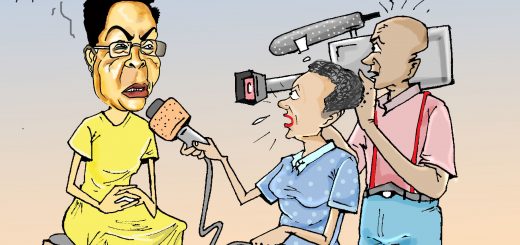The Inspectorate of Government should require a Corruption Assessment Report before any Project is implemented in Uganda.

Public servants in Uganda dream up projects to get extravagantly high paying jobs as Project staff and to plunder the project money. When you hear of project funded schools or other infrastructure being substandard or being simply abandoned in unfinished states, it is because they were poorly designed to benefit their architects and negligently supervised to enrich the contractors (who were corruptly chosen in the first place and paid substantial kickbacks to get the contract award). You will not be surprised to discover that no value for money considerations are considered during project design and that project staff roles are awarded to the very architects of the project. This gross conflict of interest ensures that projects are designed not to increase or improve service delivery but to create fat paychecks for the architects. In the corridors of these public institutions you hear gossip of the war of words over such projects by those that designed and lobbied for them seeking control over the projects by installing loyalists or nominees who share the fat paychecks and project activities with them. The whole process is corrupted to benefit public servants working in the relevant institutions. It has little to do with service delivery, which is a collateral consideration.
By failing to consider effeciency and value for money, project designers ignore elements or solutions that would ensure maximum value to the consumers and promote effeciency. For example, you probably wonder why you can’t walk into a certified shop in Kampala, purchase the materials required for an electricity connection, walk to REA or UEDCL and get a certified technician to connect your rentals to the electricity grid. Instead you have to go through a pile of bureaucratic nonsense and delays to apply for an electricity connection, wait for it for almost a year, get fed up and agree to pay a broker to get you the electricity connection. In the end the broker offers to sell you pirated electricity tokens and you enjoy pirated electricity with zero benefit to the state. The answer is that public servants in charge of electricity connections can not allow the process to be that simple and efficient because it cuts off a valuable revenue stream for them. There is a lot of money to be made in expediting connections for those willing to facilitate or simply bribe the public servants. Furthermore, it would put an end to endless projects aimed at increasing electricity connections that give them fat paychecks and allowances. Yes, it is true that certain individuals require subsidized electricity connections but many commercial land owners are willing to pay for a two day service. Such a simple and efficient system would create jobs for the certified electrician, reduce state expenditure by subsidizing connections for only the poor and free up the public institutions to take up a monitoring role. However, it is a day dream that will take years to bear fruit. They are never going to allow it to happen because if they did, the projects would evaporate.
Given the prevalence of corruption in the design and execution of projects by State agencies, it is time for the Inspectorate of Government to require a Corruption Assessment Report before any Project is implemented in Uganda. Such a report would assess the corruption risks, implement corruption safegaurds and assess the value for money of the proposed projects. The practice in public institutions is that when discretionary funds that can be spent on project staff are exhausted, the project is abandoned whether the project objective is achieved or not. That is one of the reasons why you hear tales of government failing to absorb money borrowed to finance certain projects. Once the public officers have milked the project of all discretionary funds, there is no longer an incentive to spend the none discretionary funds that they can not phisphon off. The corruption assessment report would assess all these risks and hedge against them. Furthermore, the report would help the Inspectorate of Government reduce conflict of interest and ensure transparency in awarding project positions. The report can also help curtail the spiralling and unjustified project staff salaries.
The Inspectorate of Government would use the report to monitor the project in issue and ensure that it is properly executed. Through being involved in the project assessment and monitoring the Inspectorate of Government would prevent many incidences of corruption from taking place and therefore prevent corruption before it occurs. This would reduce the amount of money spent on investigations and prosecutions and create deterrence.
Read More
- Ideal Amendments that should be included in the Magistrates Courts Amendment Bill 2026 of Uganda
- President Yoweri Kaguta Tibihaburwa Museveni is a minority President voted by only 7,946,772 (36.7%) out of 21,649,608 eligible Ugandan voters in the 2026 Presidential Elections
- Four years of IGG Beti Kamya drowned the Inspectorate of Government (IG) deeper into oblivion and irrelevancy but it Can be redeemed
- The Proposal to Make Magistrates Grade Ones Chief Magistrates is an efficient use of resources that will improve service delivery in Uganda
- If Magistrates Courts in Uganda are less competent and more prone to corruption does it mean that the poor deserve inferior justice to the rich.


